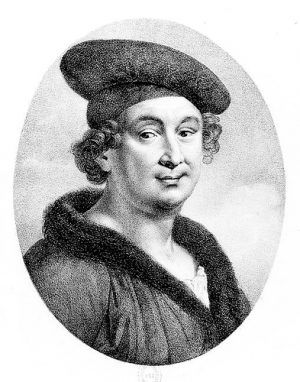Twenty-Second Friend: François Villon, "Ballade des dames du temps jadis"
In ABC of Reading, Ezra Pound wrote that a man can’t fully understand poetry if he reads only one language. Later on, when listing authors important to the development of English poetry he also included a few Frenchman. With both those points in mind, I thought it would be appropriate to include a few French poets even though the focus of this list is on English authors. So, today we’ll meet M. François Villon.
M. Villon is a pseudonym for François de Montcorbier or François des Loges, who was born in Paris in 1431. He led such an eventful life that it’s worth reading at least an article about him, but in short he spent much of his life in prison and banishment, for such crimes as robbery and killing a priest during a fight between them and some drinking friends, and traveling around France. The last we hear of him, he was on death row for his part in a brawl, but that sentence was commuted to ten years banishment from Paris by the Parlement in January 1563. What happened to him next is unkown.
As for his poetry, I’m not familiar enough with French verse to offer HSOs of my own so I’ll have to lean on others’ accounts. His poetry is technically impressive with difficult metres and rhyme schemes, and he was quite knowledgeable of the world of poetry past and present. It seems that his medieval university education did indeed take hold, despite his raucous lifestyle. His best-known work is the long poem Le Testament, which expresses his fears and laments his wasted youth. Let’s take a look at a selection from Le Testament, “Ballade des dames du temps jadis” (“Ballade of Ladies of Time Gone By”).
Dictes moy où, n’en quel pays,
Est Flora, la belle Romaine ;
Archipiada, ne Thaïs,
Qui fut sa cousine germaine;
Echo, parlant quand bruyt on maine
Dessus rivière ou sus estan,
Qui beauté eut trop plus qu’humaine?
Mais où sont les neiges d’antan!
Où est la très sage Heloïs,
Pour qui fut chastré et puis moyne
Pierre Esbaillart à Sainct-Denys?
Pour son amour eut cest essoyne.
Semblablement, où est la royne
Qui commanda que Buridan
Fust jetté en ung sac en Seine?
Mais où sont les neiges d’antan!
La royne Blanche comme ung lys,
Qui chantoit à voix de sereine;
Berthe au grand pied, Bietris, Allys;
Harembourges qui tint le Mayne,
Et Jehanne, la bonne Lorraine,
Qu’Anglois bruslerent à Rouen;
Où sont-ilz, Vierge souveraine ?
Mais où sont les neiges d’antan!
Prince, n’enquerez de sepmaine
Où elles sont, ne de cest an,
Qu’à ce refrain ne vous remaine:
Mais où sont les neiges d’antan!
Now, I’m sure all of you know French, but just in case you’re a little rusty, here it is in English, as translated by Dante Gabriel Rossetti:
Tell me now in what hidden way is
Lady Flora the lovely Roman?
Where’s Hipparchia, and where is Thais,
Neither of them the fairer woman?
Where is Echo, beheld of no man,
Only heard on river and mere,—
She whose beauty was more than human? . . .
But where are the snows of yester-year?
Where’s Héloise, the learned nun,
For whose sake Abeillard, I ween,
Lost manhood and put priesthood on?
(From Love he won such dule and teen!)
And where, I pray you, is the Queen
Who willed that Buridan should steer
Sewed in a sack’s mouth down the Seine? . . .
But where are the snows of yester-year?
White Queen Blanche, like a queen of lilies,
With a voice like any mermaiden,—
Bertha Broadfoot, Beatrice, Alice,
And Ermengarde the lady of Maine,—
And that good Joan whom Englishmen
At Rouen doomed and burned her there,—
Mother of God, where are they then? . . .
But where are the snows of yester-year?
Nay, never ask this week, fair lord,
Where they are gone, nor yet this year,
Except with this for an overword,—
But where are the snows of yester-year?
This is excellent stuff, and I love the line “Mais où sont les neiges d’antan!” Snow works so well because it is beautiful while it lasts, but of course, it doesn’t last for long. The line “La royne Blanche comme ung lys” is pretty clever, though it doesn’t quite work in English (a literal translation would be something like “The Queen White as a lilly”). This poem is also a perfect length, long enough for him to list several examples of famous women from times past (and keep in mind, one theme of Le Testament is death and old age) and make his point, but a list like this could get tedious if it went on for much longer.
M. Villon may be the first Frenchman we meet, but he won’t be the last.
